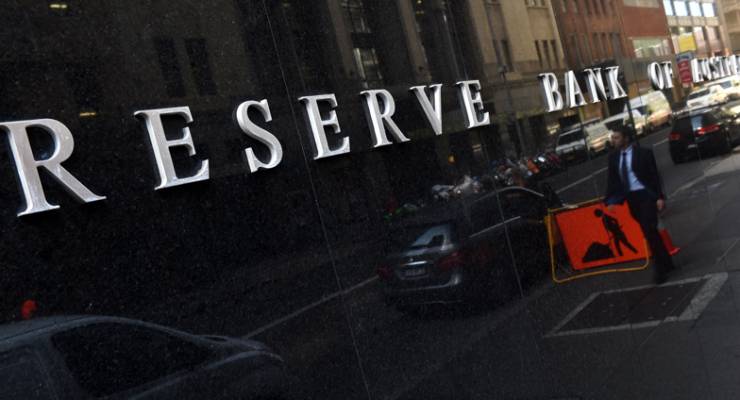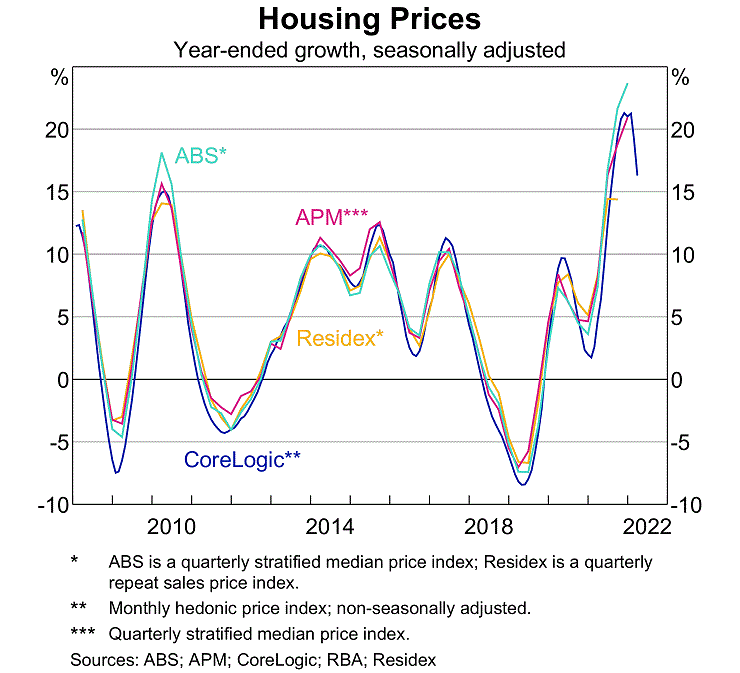
Scott Morrison wants to let you raid your super to buy a house. This is a naked vote ploy for frustrated first home buyers. That’s a group of young, tertiary educated people — a group containing the kind of Labor voters who might swap to the Liberals as they age. Morrison would like to bring that swap forward. This is the politics of it: a desperate move in desperate times. So far, so obvious. The economics of it are more interesting.
They go back to 2018-19. What was happening in 2018-19?
House prices were falling. Not a giant crash, just a correction. The period in which prices were lower than they had been a year earlier lasted less than two years; at their worst, house prices were down 7% or 8% on a year earlier. The lessons of this relatively minor correction changed the course of Australian economic history and are still haunting us today.

The 2018-19 house price correction was a long-awaited event. In the US, house prices had crashed hard in the global financial crisis (GFC) of 2008. Australia had seen a much more modest slowdown at that time, followed by several years of 5-10% growth. Prices were at record highs. It left a lot of commentators and economic policymakers feeling a price correction was due. What’s more, apartment construction was zooming ahead, cranes dotted the skylines, and the Reserve Bank of Australia (RBA) made regular warnings about the effect of that extra supply on house prices. In 2016, the OECD warned the end of our house price boom could be “dramatic and destabilising”.
A big crash?
At the time, the lessons of the US subprime market collapse and subsequent GFC were extremely salient. Everyone was nervous about financial market meltdown in the case of a property price fall, and a lot of work was going on behind the scenes making banks resilient.
As it happened, our financial markets remained very much intact during the 2018-19 house price slowdown. What happened instead was unexpected and changed the course of Australian history. The RBA was wrong-footed.
You see, initially, the RBA almost welcomed the house price fall, on two levels. It seemed to want Australians to learn that house prices didn’t only go up. It also wanted the elevated price-to-income ratios to deflate. Then deputy governor Philip Lowe had previously pointed out that rising house prices don’t really make us richer.
In early 2019, the RBA governor delivered a very sanguine speech about the fall in house prices. “[T]he adjustment in the housing market is manageable for the overall economy,” he said. “It will also have some positive side-effects by making housing more affordable for many people.”
I would have loved to be a fly on the wall in the RBA over the next seven months. There must have been some very animated meetings and disagreements. Lessons learnt in that period appear to have changed the course of the nation’s economic history.
Houses and holes
In October 2019, seven months and 11 days later, then RBA deputy governor Guy Debelle walked to a podium at the Sofitel Sydney and delivered a very different speech.
The speech represented a confession, an admission and a turning point. The RBA told us something certain observers has been talking about for a long time at that point — the Australian economy is very much about housing.
When housing slows down, the real economy slows down, the RBA deputy governor said. Falling prices hit consumption via the wealth effect, but the concomitant decline in housing turnover also hollows out earnings for real estate agents, lawyers, etc.
“We had not fully taken account of this in our forecasts of GDP,” Debelle confessed to an audience of chartered financial analysts. “It is part of the explanation of why GDP growth has turned out to be slower than we had expected.”
Debelle noted that while construction employs 2% of people directly, fully 6% of Australian employment is related to the construction sector. He cited “architects, draftspeople and construction engineers, and … the manufacturing sector through steel, bricks, etc”.
“You could be forgiven for thinking that the housing market is the Australian economy. That clearly is not the case. But at the same time, developments in the housing market, both the established market and housing construction, have a broader impact than the simple numbers would suggest,” Debelle admitted.
The speech did not pass entirely unnoticed. Credit to Alex Joiner of Industry Funds Management for understanding what it meant. But overall, this significant moment in Australian economic history was not well remarked on at the time.
It explains a lot about what has happened since. Nobody is now willing to let house prices fall. Not the RBA, which slashed rates to zero and declared high housing prices were not its problem, and not the federal government, which has piled subsidy upon subsidy into the housing market. Too many fingers were burned in 2019.
A government-backed asset
This latest announcement from Scott Morrison is not only a way to get elected but an insurance policy for the Coalition in case they win. If by some small chance they actually can form government, there won’t be such a big housing market stagnation and the real economy won’t take such a big dip.
This will mean steadier employment and happier voters. Of course, it also exacerbates the problem of an economy addicted to housing. We’ve gone a long way down this dead-end street of making the Australian economy into a housing economy. Morrison’s policy takes us further. That means when we finally have to reverse out we will have further to go.
While for now this is just Coalition policy, we cannot rule out Labor also bringing in a plan to prop up housing if elected. Perhaps not using super balances, probably relying on some other tool. After all, if housing wobbles under the effect of higher interest rates, and if the economy weakens — as the RBA says it would — a Prime Minister Albanese could face a very restless electorate that blames him.
The opposition would gleefully label Labor terrible economic managers. A label that would be unfair, very easy for the punters to believe, and one Albo is desperate to avoid. It’s going to be very hard for all sides of politics to let housing prices deflate. This is the paradox we find ourselves in.








And don’t forget that Labor took policies to the 2019 election which would have reduced the attractiveness of private houses as investments. They received their lowest primary vote ever. The horse has now probably bolted.
Yes, JM. Yep, yep, yea…well – yes. Though the roots go back a lot further than debelle’s speech, which was more akin to the bridge’s first tentative warning ring of the engine room bell, to prepare for the iceberg ahead. There’s not a decent Oz economist in this country who hasn’t known since the GFC how precariously, helplessly trapped by housing our whole economy now is. But alas there’s still not one truly prepared to say so out loud, at least as loudly as has been needed for at least a decade, or more..
Our national economy hitting this iceberg, and us getting beyond it without sinking/drowning too many, is going to collectively hurt us much more, and take much longer, than any Australian alive can remember. We also need to prepare for our appalling recognition that…the first class passengers and most of the crew have either already disembarked, or are long prepositioned hogging the lifeboats.
It’s a very fine analysis JS, but let’s none of us pretend our predicament was incubated only since 2018/19.
THE HOUSING MARKET IS A SCAM!!
Houses/apartments should be at their greatest value at end of construction (same as motor cars). From there, it should be depreciation based on age / value for number of bedrooms / value for area of house and land / value for R-Value.
This is an interesting if extremely depressing article. I rent; that conveyer belt that leads to the rotating knives is moving ever faster and won’t stop in what’s left of my lifetime.
I don’t think maintenance of house prices explains the political response. The political response on this ends on 22 May and then we head in to a slowing economy for the rest of the year and that includes the housing sector.
It doesn’t matter which Party wins because neither policy will have any meaningful affect on the housing market anyway. The simple and unavoidable truth tis that we have to build more low cost housing (not McMansions) and not just for welfare recipients but for low income earners to rent and pay-off over time. Not an original idea, we did it for decades after WW2 and it worked.